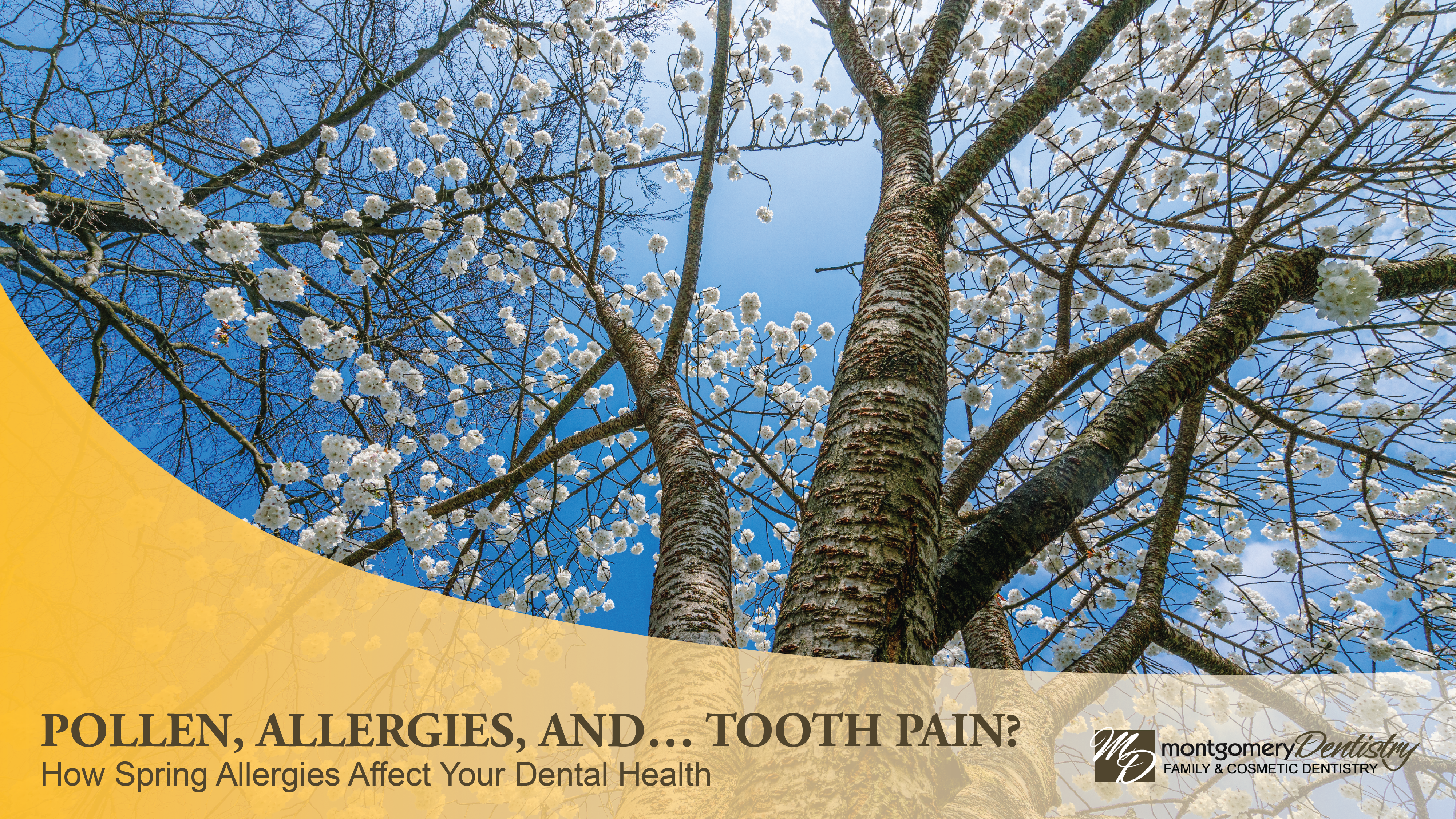As flowers bloom and the weather warms up, many of us brace for the familiar wave of sneezing, itchy eyes, and sinus pressure that comes with allergy season. Pollen is a nuisance we’ve learned to live with—but have you ever considered how it might be affecting your teeth and jaw?
Believe it or not, seasonal allergies can sometimes lead to surprising dental discomfort. Let’s take a closer look at how spring allergies might be behind that unexpected toothache—and what you can do to protect your oral health.
How Allergies Affect Your Sinuses (And Your Teeth)
When allergy season hits, your sinuses often bear the brunt of the inflammation. The maxillary sinuses, located just above your upper back teeth, can become swollen and congested due to pollen and other allergens in the air. This pressure can irritate nearby nerves, leading to a sensation that closely mimics a toothache—especially in the upper molars. The pain may feel dull and achy or even sharp at times, making it easy to mistake for a cavity or dental infection.
According to the American Academy of Otolaryngology–Head and Neck Surgery, sinusitis and seasonal allergies can cause facial pain, dental pressure, and even tenderness in the upper jaw. If the pain worsens when you bend over or shift with your head position, that’s often a sign the discomfort is sinus-related—not dental. However, if the pain persists, it’s important to see a dental professional to rule out any underlying issues.
Other Springtime Dental Issues to Watch Out For
Sinus pressure isn’t the only way spring allergies can impact your mouth. Here are a few other common dental side effects that tend to show up this time of year:
• Dry Mouth
Antihistamines, while great for relieving allergy symptoms, can reduce saliva production. Without enough saliva, your risk of cavities, bad breath, and gum irritation goes up. According to the American Dental Association, dry mouth increases the likelihood of plaque buildup and oral infections.
• Mouth Breathing
When nasal passages are blocked, many people breathe through their mouths, especially at night. This dries out the oral tissues, increasing bacteria and potentially causing soreness and inflamed gums.
• Teeth Grinding (Bruxism)
Allergy-related stress and poor sleep can contribute to bruxism, a condition where you grind or clench your teeth—often without realizing it. Over time, this can lead to jaw pain, worn enamel, and even cracked teeth.
Spring may look beautiful outside, but it can create chaos inside your mouth if you’re not careful!
When to See a Dentist vs. a Doctor
It can be tough to tell if that nagging tooth pain is from allergies or a real dental issue. Here’s how to tell the difference:
Likely Sinus-Related:
- Pain accompanied by nasal congestion or facial pressure
- Discomfort that worsens when bending over or lying down
- Pain that moves or shifts locations
Possibly Dental:
- Sharp, localized tooth pain
- Sensitivity to hot or cold foods
- Pain that persists even after allergy symptoms improve
Still not sure? Don’t play the guessing game. A quick visit to Montgomery Dentistry can help determine whether the problem is sinus-related or something more serious.
Spring Dental Health Tips
A few small changes can go a long way in protecting your dental health during allergy season. Here are some dentist-recommended tips:
- Stay Hydrated: Water helps combat dry mouth and supports healthy saliva production. (Delta Dental)
- Chew Sugar-Free Gum: It encourages saliva flow, helping to keep your mouth clean and protect your enamel. (ADA)
- Use a Humidifier: Moist air helps reduce congestion and keeps oral tissues from drying out overnight.
- Stick to Your Oral Hygiene Routine: Allergies can make you feel sluggish, but brushing twice a day and flossing daily is more important than ever.
- Replace Your Toothbrush: After recovering from allergy-related illness, switch to a fresh brush to avoid reinfection.
- See Your Dentist: If symptoms persist or you’re unsure about a lingering ache, let us take a look.
Spring allergies can do more than make you sneeze—they can have a real impact on your dental health. From sinus pressure that mimics toothaches to the drying effects of medications, it’s important to stay proactive and informed.
If you’re experiencing unexpected dental discomfort this season, don’t wait. Call Montgomery Dentistry at 334-342-9988 to schedule your appointment. Let us help your smile bloom as beautifully as the season itself!
About the Author
-

Dr. Amy Morrison Anderson
Dr. Amy Morrison Anderson joined our practice in July 2005. She is a lifelong resident of Montgomery, and a graduate of Jefferson Davis High School, Auburn University, and the University of Alabama, Birmingham School of Dentistry.
She is a member of the American Dental Association, the Alabama Dental Association, and the Academy of General Dentistry.
Dr. Anderson most enjoys doing veneers. “The reward of seeing my patients’ self-confidence and self-esteem boosted by a beautiful smile is immeasurable.”
Brandon, her husband, is also a graduate of Jefferson Davis High School and Auburn University. They have one daughter, Bailey Elizabeth, and twin sons, Caden and Cole.
